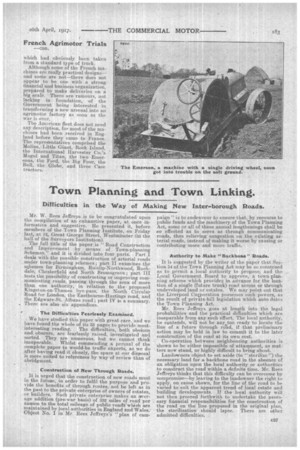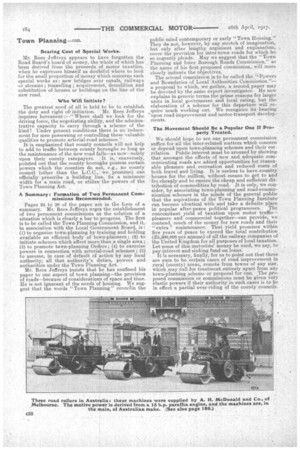Town Planning and Town Linking.
Page 11

Page 12

If you've noticed an error in this article please click here to report it so we can fix it.
Difficulties in the Way of Making New Inter-borough Roads.
Mr. W. Rees Jeffreys is tb be congratulated upon the compilation of an exhaustive paper, at once in formative and suggestive. He presented it, before members of the. Town Planning Institute, on Friday last, at 12, Great George Street, Westminster (irk the hall of the Surveyors Institution).
The full title of the paper is Road Construction and Improvement by means of Town-planning Schemes," and it is divided into four parts. Part deals with the possible construction of arterial roads .under town-planning schemes; part IT examines the sehemes for Birmingham, Ruislip-Northwood, Rochdale, Chesterfield and North Bromsgrove ; part HI tests the possibility of constructing or improving communicating roads, passing through the area of more than one authority, in relation to the proposed :Kingston-on-Thames bye-pass,the North Circular Iload for London, the Eastbourne-Hastings road, and the Edgware-St. Albans road; part I.V is a summary. There are also six appendices.
• The Difficulties Fearlessly Examined.
We have studied this paper 11; i t h great care, and we have found the whole of its 35 pages to provide most interesting reading. The difficulties, both obvious and obscure, are fearlessly raised, investigated and sorted. They are numerous, but we cannot think insuperable. Whilst commending a perusal of the complete paper to would-be traffic experts, as we do After having read it closely, the space at our disposal is more suited to references by way of review than of abridgment.
Construction al New Through Roads.
It is urged that the construction of new roads must in the future, in order to fulfil the purpose and provide the benefits of through routes, not be left as in the past to the private enterprise of owners of estates, or builders. Such private enterprise makes an riverage addition (Pre-war basis) of 332 miles of road per annum to the total mileage of pulalic roach-which are maintained by local authorities in England and Wales. Objeot No. I in Mr. Rees Jeffreys's "plan of cam
paign " is to endeavour to ensure that, by recourse to public funds and the machinery of the Town Planning Act, some or all of these annual lengthenings shall be so effected as ,to serve as through communicating roads, thus relieving congestion on the existing arterial roads, instead of making it worse by causing or contributing more and more traffic.
Authority to Make "Backbone" Roads.
It is suggested by the writer of the paper that Section 54 of the Town Planning Act May be so construed as to permit a local authority to proposes and the Local Government Board to approve, a town-planning scheme which provides in advance for the location of a single (future trunk) road across or through undeveloped land or estates. We may point out that the Liverpool Covoration possesses such powers, as the result of private-bill legislation which ante dates the Town Planning Act.
Mr. Rees Jeffreys goes at length into the legal probabilities and the practical difficulties which are inseparable from any such effort. The local authority, he contends, will not be any too ready to locate the line of a future through road,. if that preliminary action may be held in law to commit it to the later construction of the road at its own cost.
Co-operation between neighbouring authorities is Shown to be either impossible of attainment, as .matters now stand, or highly difficult to bring about.
Landowners object to set aside (to sterilize ") the necessary land for a backbone -road in the absence of an obligation upon the local authority or authorities to construct the road within a definite time. Mr. Rees JeffreYs thinks that this difficulty can be overcome by compromise—by leaving to the landowner the right to apply, on cause shown, for the line of the road to be
varied to suit the apparent trend of local estate and building developments. If the local authority will not then proceed forthwith to undertake the necessary financial responsibilities for the construction of the road on the line proposed in the original plan, the sterilization should lapse. There are other admitted difficulties. . Bearing Cost of Special Works.
Mr. Rees Jeffreys appears to have forgotten the Road Board's hoard of money, the whole of which has been derived from the proceeds of motor taxation, when he expresses himself as doubtful where to look for the small proportion of money which concerns such special works as : new bridges over canals, railways or streams ; tunnelling ; acquirement, demolition and substitution of houses or buildings on the line of the new road.
Who Will Initiate ?
The greatest need of all is held to be to establish the duty and right of,initiation. Mr. Rees Jeffreys inquires hereanent :—" Where shall we look for the driving force, the negotiating ability, and the administrative capacity to carry through a scheme of the kindi Under present conditions there is no inducement for men possessing or controlling these valuable qualities to promote arterial-road schemes."
It is emphasized that county councils will not help to add to traffic between county boroughs so long as the maintenance of the new road falls—as now--solely upon their county ratepayers. It is, ' conversely, pointed out that the county boroughs possess certain powers which the counties do not, e.g., no county. council (other than the L.C.C., we presume) can officially prescribe a building line, fix a minimum' width for a main road, or utilize the powers of the Town Planning Act.
A Summary : Formation of Two Permanent Cornmissions Recommended.
Pages 24 to 30 of the paper are in the form of a summary. Air. Rees Jeffreys urges the establishment of two permanent commissions as the solution of a. situation which is clearly a bar to progress. The first is to be called the Town. Planning.Commission, and it, in association with the Local Government Board, is : (1) to organize town-planning by training and holding available an efficient body of town-planners ; (2) to initiate schemes which affect more than .a single area; (3) to promote town-planning Orders ; .(4) to exercise powers in connection with arterial-road schemes ; (5) to assume, in case of default of action by any local authority; all that authority's duties powers and authorities under the Town Planning Act.
Mr. Rees Jeffreys insists that he has confined his paper to one aspect of town planning—the provision of roads—because of considerations of space and time. He is not ignorant of the needs of housing. We suggest that the words "Town Planning" coverlin the public mind contemporary or early " Town Housing."' They de not, however, by any stretch of imagination, . but only after lengthy argunient and explanation, cover the provision for inter-town roads for which he so cogentlipleads. May we suggest that the "Town Planning and Inter Borough Roads Commission," as the name of his first proposed commission,.will more closely indicate the objectives.
The second commission is to be called the `i Powers and Boundaries of Local Authorities Commission "a proposal to which, we gather, a second paper may be devoted by the same expert investigator. He now explains in generic terms the prime reasons for larger units in local government and local rating, but the elaboration of a scheme for this departure will require much working. out. We recognize its bearing upon road-improvement and motor-transport developments.
The Movement Should Be a Popular One If Properly Treated.
We should hope to see one permanent commission suffice for all the inter-related matters which concern or depend upon town-planning schemes and their correlation. Public interest must be aroused by showingthat amongst the .effects of new, and adequate communicating roads are added opportunities for reasonable pleasure and recreation and reduced costs of both travel and living. It is useless to have country. houses for the million, without means to get to and Ire cheaply and to ensure the cheap and sufficient diStribution of commodities by road. It is only, we consider, by associating town-planning-and road-communication, schemes in the minds of the general public that the aspirations of the Town Planning Institute can become identical with-and take a definite place in. popular after-peace political programmes. The concomitant yield of taxation upon motor traffic— pleasure and commercial together—can provide, we contend, much. of the money for new roads and their " extra " maintenance. That .yield promises within five years of peace to exceed the total contribution (£5,300,000 per annum) of all the railway companies of the United Kingdom for all purposes of local taxation. Let-some of this motorists' money be used, we say, to pay interest and sinking fund on loans.
It is necessary, finally, for us to point out that there are sure to be certain cases of road improvement in rural (county) areas, remote from towns of any size, which may:all for treatment entirely apart from any town-planning scheme or proposal for one. The proposed commission or commissions must be given very elastic powers if their authority in such 'cases is to be in effect a partial over-riding of the county councils.
























